Setting the Stage for Effective TMS Therapy
Neuropsychological baseline testing before Transcranial Magnetic Stimulation (TMS) plays a pivotal role in tailoring treatment, assessing patient suitability, and tracking outcomes. These assessments facilitate a comprehensive understanding of a patient's current cognitive and neurophysiological state, providing an essential foundation for personalized therapy plans and improving the potential efficacy of TMS treatments.
Purpose of Neuropsychological Baseline Testing Before TMS
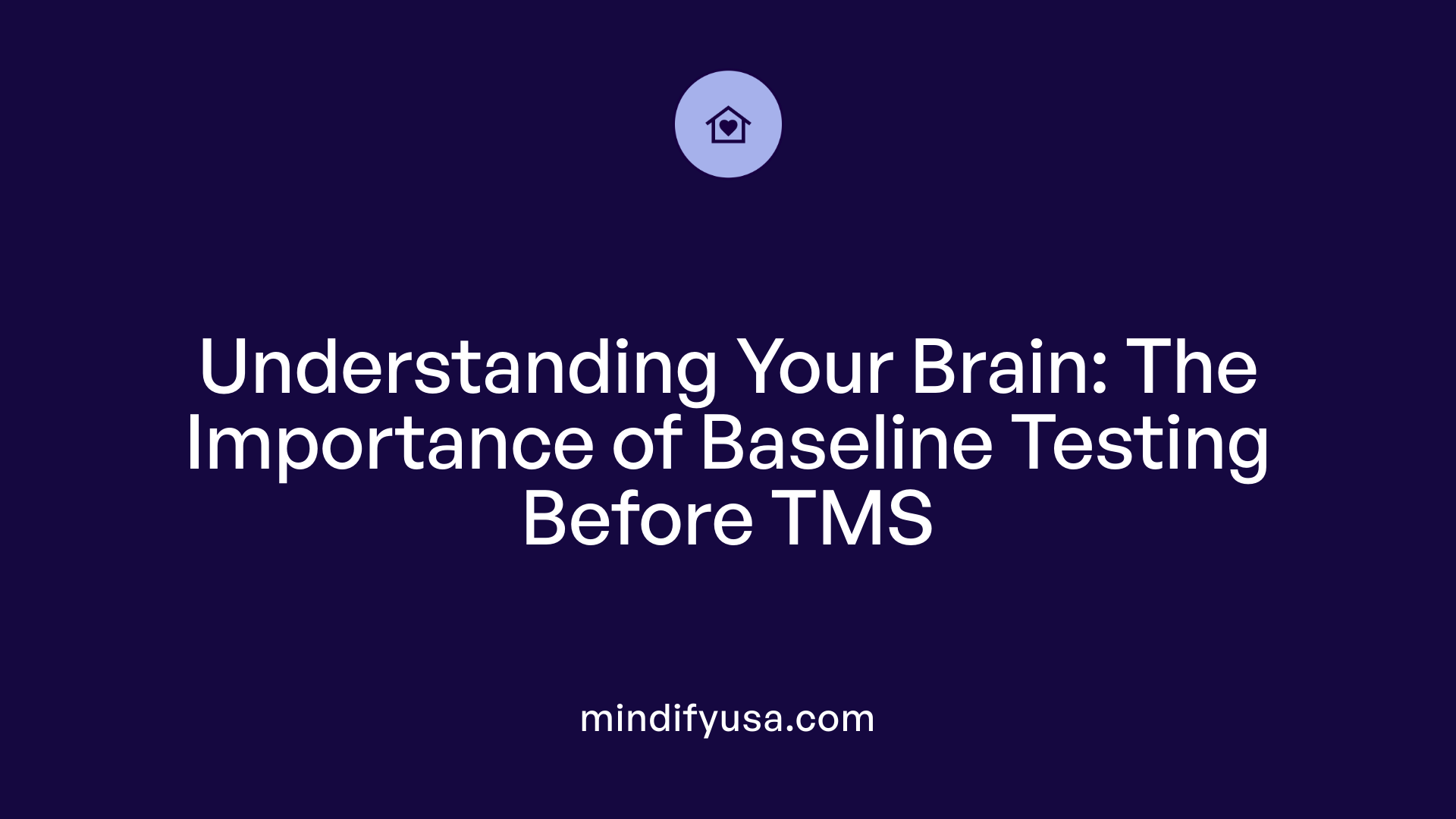
What is the purpose of neuropsychological baseline testing before TMS therapy?
Neuropsychological baseline testing is an important step before beginning Transcranial Magnetic Stimulation (TMS) treatment. It involves a series of assessments that measure various aspects of brain function, such as memory, language, attention, problem-solving, and social skills. These tests create a detailed profile of a patient's current cognitive abilities.
Establishing this baseline data is crucial because it provides a reference point for future evaluations. By comparing post-treatment results to this initial assessment, clinicians can determine whether TMS is effectively improving certain cognitive functions or if there are any negative effects.
Additionally, these tests help reveal individual strengths and weaknesses in cognitive skills. Knowing these details allows healthcare providers to tailor treatment plans that target specific areas needing support. This personalized approach can optimize patient outcomes.
Baseline testing also plays a vital role in research settings. It helps scientists understand how TMS impacts different brain functions, making it possible to identify which patients are most likely to benefit from the therapy.
In summary, neuropsychological baseline assessments are essential for monitoring changes during TMS therapy, customizing treatments, and advancing research efforts. They support better clinical decision-making and improve the overall quality of patient care.
Procedures and Components of Pre-TMS Neuropsychological Assessments
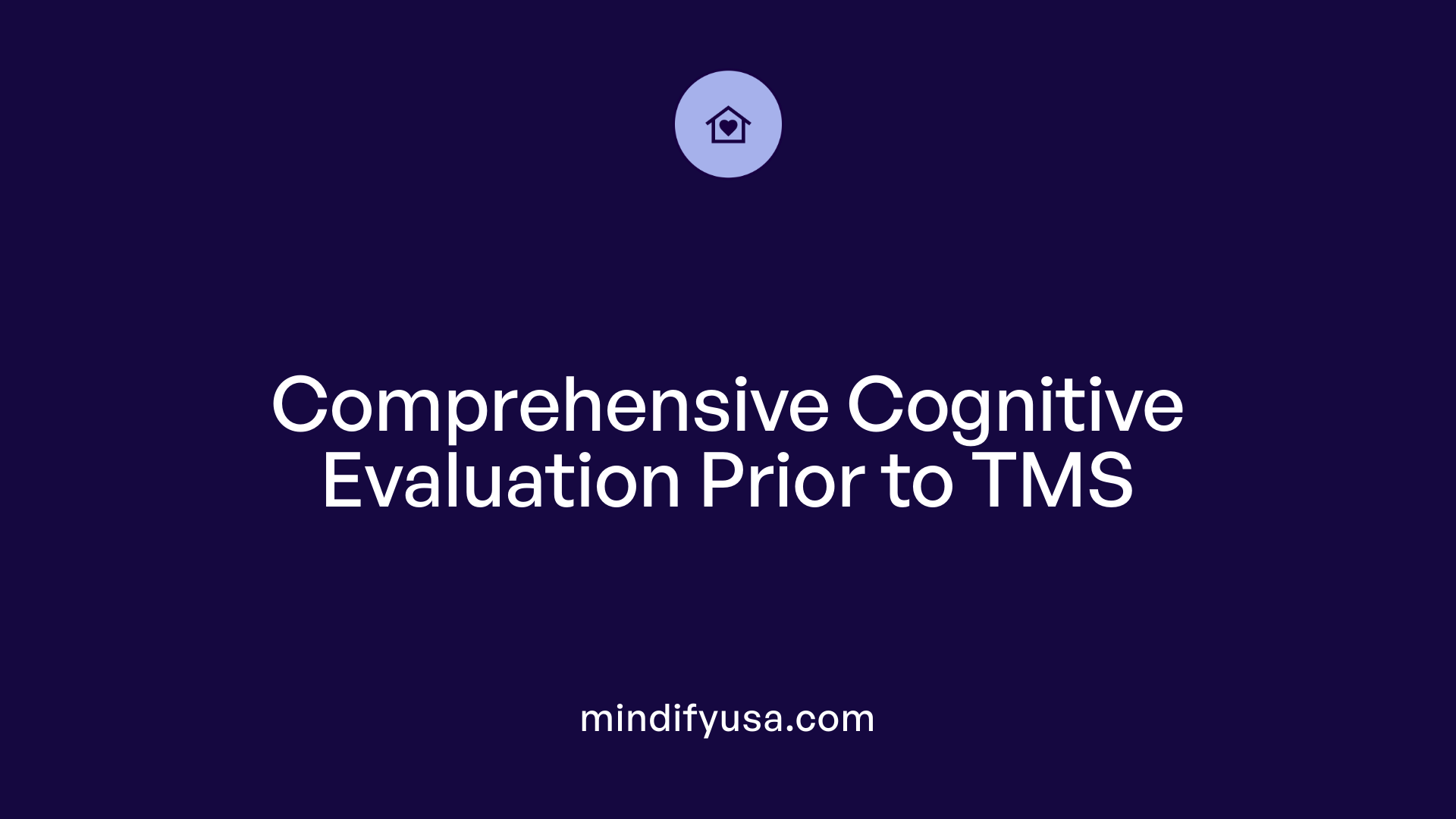 Prior to Transcranial Magnetic Stimulation (TMS), a comprehensive neuropsychological evaluation is conducted to establish an individual's cognitive and psychological baseline. This assessment involves multiple procedures designed to evaluate various brain functions.
Prior to Transcranial Magnetic Stimulation (TMS), a comprehensive neuropsychological evaluation is conducted to establish an individual's cognitive and psychological baseline. This assessment involves multiple procedures designed to evaluate various brain functions.
Standardized testing batteries are central to the process. These tools include a variety of cognitive tests that assess memory, attention, executive functioning, language, and visuospatial skills. Common instruments may feature well-known assessments like the Wisconsin Card Sorting Test (WCST), which evaluates cognitive flexibility and problem-solving ability, and the Trail Making Test (TMT), which measures processing speed and task-switching. Verbal Fluency (VF) tests are also frequently used to assess language skills and executive functions.
In addition to these tests, clinical interviews and questionnaires are employed. These are conducted by trained neuropsychologists and include structured or semi-structured interviews to gather information about personal history, current cognitive concerns, and psychiatric health. Typical questionnaires might include the PHQ-9 for depression, the Yale-Brown Obsessive Compulsive Scale (Y-BOCS) for obsessive-compulsive symptoms, and the Clinical Global Impressions-Improvement scale (CGI-I) to assess overall mental health status.
The assessment scope covers multiple cognitive domains to identify strengths, weaknesses, and any pre-existing concerns that could influence treatment outcomes. This thorough evaluation helps to ensure that the individual’s cognitive profile is well-documented, serving as a reference point for future comparisons.
Results from these assessments are compared to normative data to distinguish typical from atypical functioning. The insights gained also include determining if psychiatric or behavioral issues—such as depression or impulsivity—are present, which may require additional attention before or after TMS.
Overall, pre-TMS neuropsychological testing provides detailed information necessary to tailor treatment plans, monitor changes over time, and better understand how brain stimulation might influence neurocognitive and behavioral health. The entire process typically lasts several hours and is performed in outpatient settings, ensuring a comprehensive approach to brain health assessment.
Role of Baseline Testing in Preparing for TMS Therapy
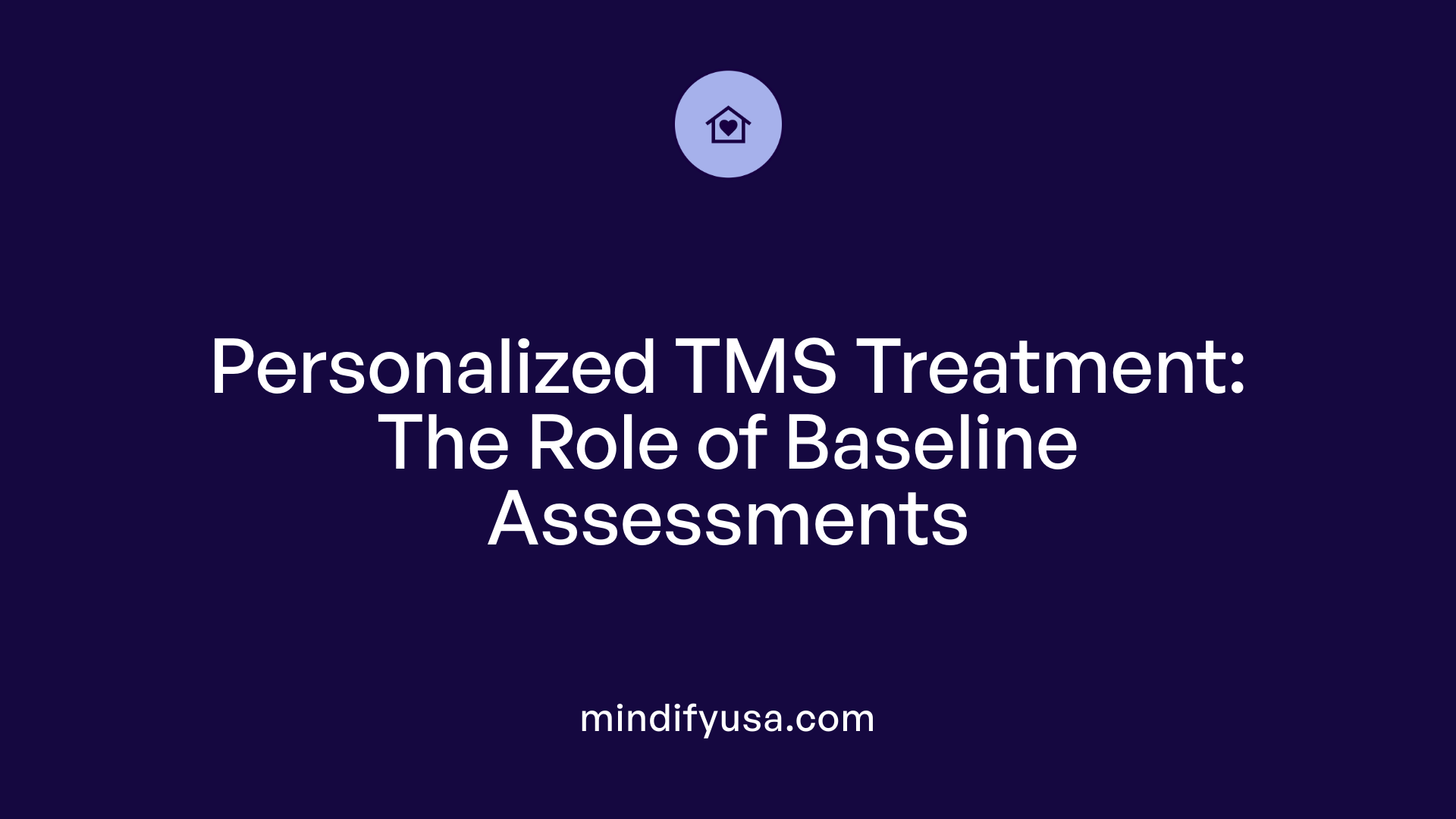
How does baseline neuropsychological testing aid in preparing for TMS therapy?
Baseline neuropsychological testing plays an essential role in customizing transcranial magnetic stimulation (TMS) treatment plans. By evaluating a patient’s cognitive functions—such as memory, language, attention, and processing speed—clinicians gain a comprehensive understanding of their individual neurological profile. This information allows for tailored stimulation protocols that suit the patient’s specific needs, increasing the likelihood of successful outcomes.
In addition to cognitive assessments, neurophysiological markers like TMS-evoked potentials (TEPs) offer valuable insights. TEPs, including components such as the N45 and P60, reflect brain activity patterns related to cortical excitation and inhibition. These markers can serve as predictors of how a patient might respond to TMS, particularly in mental health conditions like depression where cortical balance is pivotal.
By establishing these baseline measures, clinicians can identify patients who are most likely to benefit from TMS therapy. This helps optimize treatment parameters, such as stimulation intensity and location, enhancing overall effectiveness.
Furthermore, baseline testing provides a reference point for ongoing monitoring. During and after treatment, clinicians can track changes in neuropsychological and neurophysiological metrics to evaluate the intervention's impact. This process supports adjustments to therapy and helps ensure that the treatment remains aligned with the patient’s evolving needs.
In summary, comprehensive baseline assessments—incorporating cognitive profiling and neurophysiological markers—are critical to personalizing and improving TMS treatment strategies, ultimately fostering better patient outcomes.
Broader Clinical Contexts and Applications
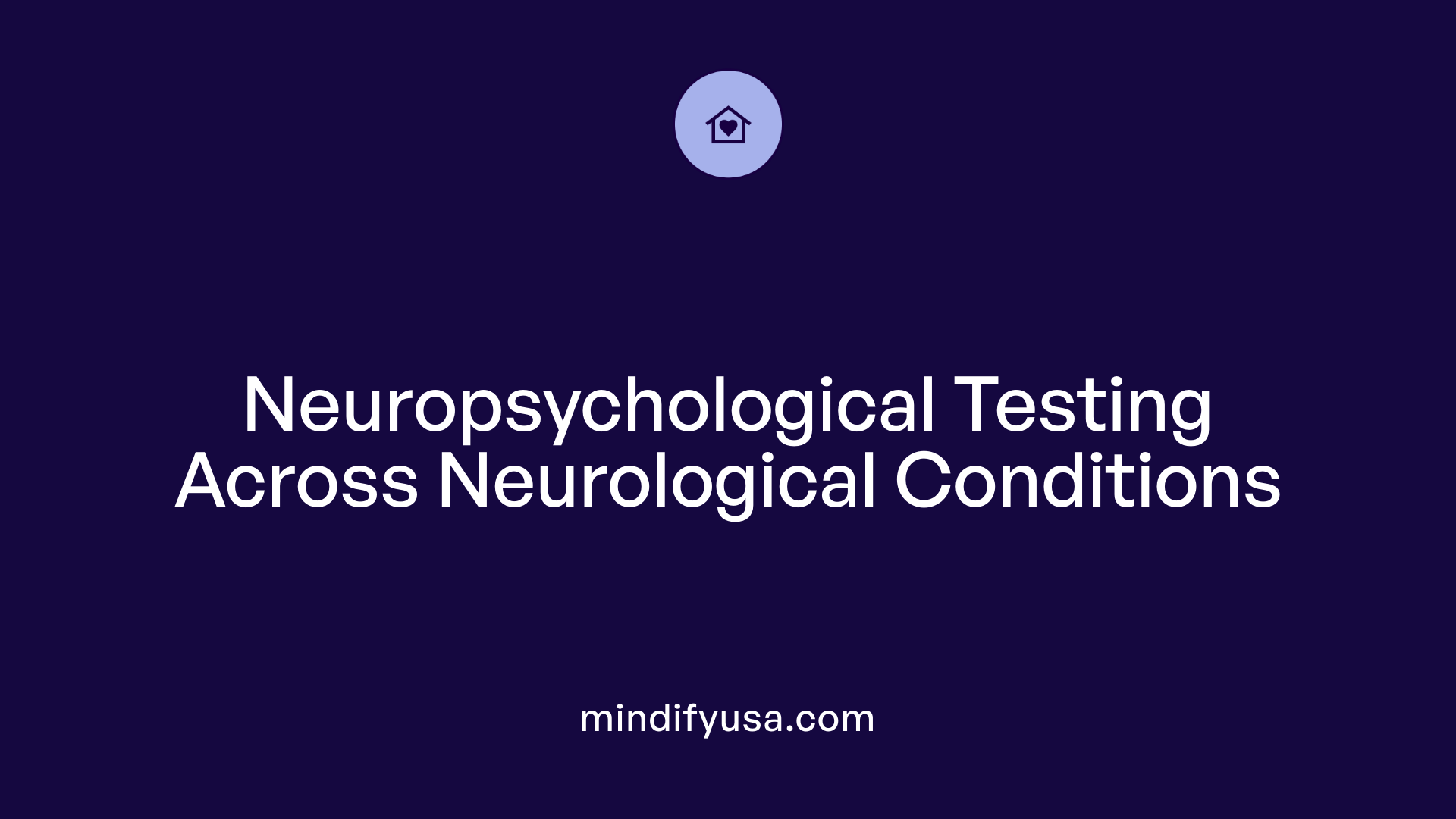 Neuropsychological assessments play a vital role well beyond their use in TMS therapy. They are essential tools in the diagnosis and management of many neurological conditions, such as Alzheimer’s disease, dementia, stroke, and multiple sclerosis. By evaluating various cognitive domains like memory, attention, language, and executive functions, these tests help clinicians understand the nature and severity of cognitive impairments.
Neuropsychological assessments play a vital role well beyond their use in TMS therapy. They are essential tools in the diagnosis and management of many neurological conditions, such as Alzheimer’s disease, dementia, stroke, and multiple sclerosis. By evaluating various cognitive domains like memory, attention, language, and executive functions, these tests help clinicians understand the nature and severity of cognitive impairments.
In cases of brain injury or stroke, neuropsychological testing provides a detailed picture of cognitive deficits, guiding rehabilitation strategies and tracking recovery over time. For patients undergoing evaluation for epilepsy surgery or Parkinson’s disease, preoperative neuropsychological assessments inform surgical planning by identifying cognitive strengths and vulnerabilities.
Monitoring disease progression is another crucial application. Repeated assessments help determine how conditions such as Alzheimer’s evolve, enabling adjustments in treatment plans and care approaches. Furthermore, these evaluations assess the functional impact of neurological and psychiatric disorders on daily life, including decision-making capacity and ability to return to work or independent living.
In broader contexts, neuropsychological testing also aids in distinguishing between normal aging and pathological cognitive decline. They are used in forensic settings to assess mental capacity and in research to uncover brain-behavior relationships. Overall, these assessments are indispensable across medical, legal, and research fields, providing standardized insights that improve diagnosis, treatment planning, and outcome evaluation.
Search query: applications of neuropsychological assessment beyond TMS
Integration with Neurophysiological Assessments like EEG
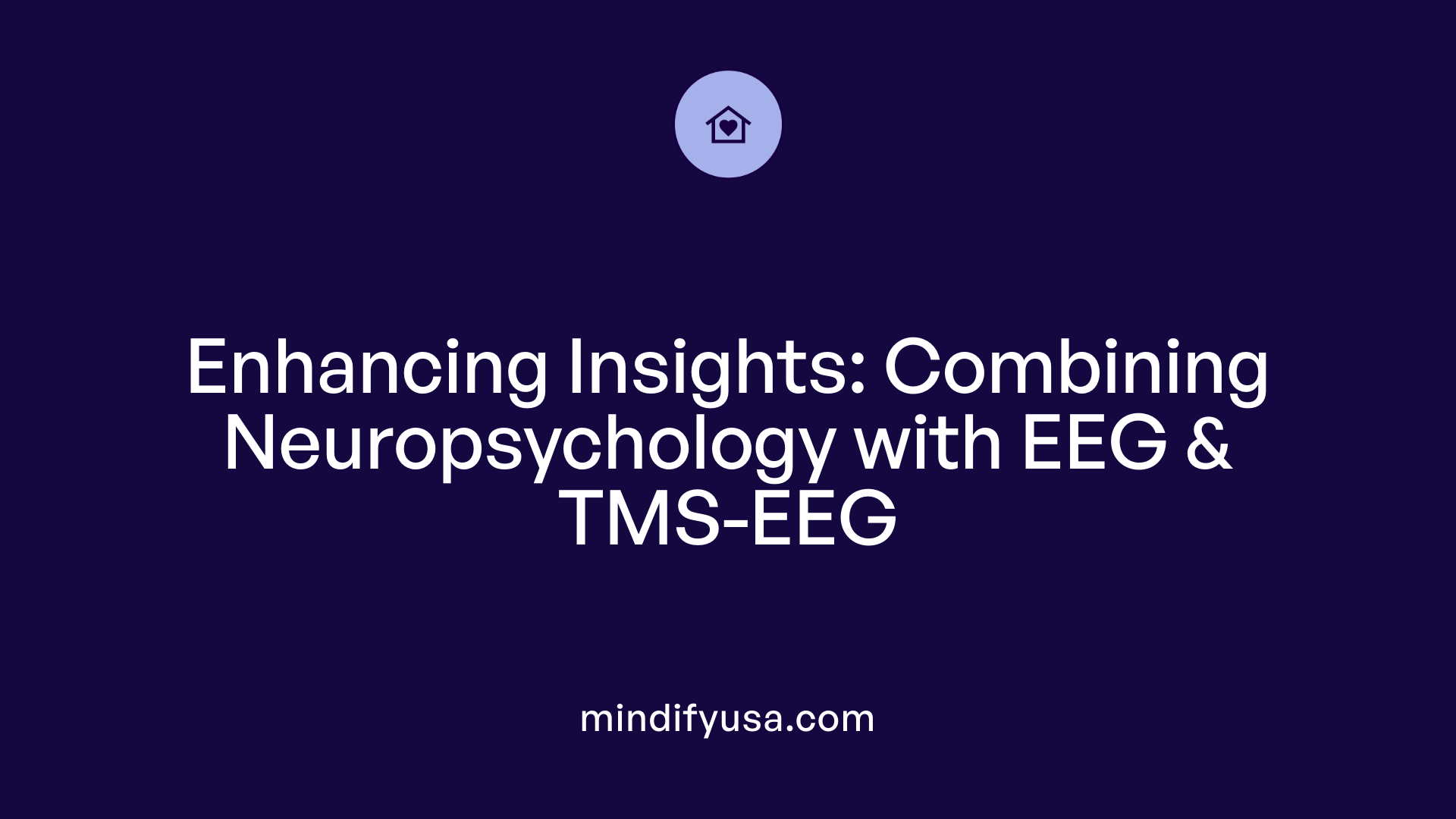 Neuropsychological testing can be combined with neurophysiological tools such as EEG and TMS-EEG to provide a more complete picture of brain function. When neuropsychologists work alongside neurophysiologists, they can integrate the results from cognitive tests with electrical brain activity recordings.
Neuropsychological testing can be combined with neurophysiological tools such as EEG and TMS-EEG to provide a more complete picture of brain function. When neuropsychologists work alongside neurophysiologists, they can integrate the results from cognitive tests with electrical brain activity recordings.
During assessments, EEG may be used to detect abnormal brain waves, such as epileptiform discharges, which can interfere with cognitive performance. For example, in patients with epilepsy, EEG monitoring can reveal interictal epileptiform discharges (IEDs) or subclinical epileptiform discharges (sEDs) that negatively affect cognition. Recognizing these transient abnormalities helps clinicians interpret neuropsychological test results more accurately.
In cases involving neurodegenerative diseases like Alzheimer’s, TMS-EEG allows researchers and clinicians to observe cortical excitability and connectivity patterns. This information correlates with cognitive impairments, helping to understand disease progression and aiding in the development of targeted treatments.
The combination of these assessments not only improves the detection of subtle neurophysiological changes but also enhances the precision of interventions such as transcranial magnetic stimulation (TMS). By accounting for both behavioral and electrical brain activity data, healthcare providers can tailor treatments to individual patients more effectively.
Overall, integrating neuropsychological testing with EEG and TMS-EEG supports better diagnosis, prognosis, and therapy planning, making it a promising approach in modern neurorehabilitation and research.
Clinical Significance of Baseline Testing for TMS Candidacy and Planning
Baseline neuropsychological testing plays a crucial role in preparing for Transcranial Magnetic Stimulation (TMS) treatment. This initial assessment provides valuable insights into a patient's brain function, including cortical excitability and neural circuitry. By evaluating areas such as language, memory, attention, and motor skills, clinicians can identify specific neural patterns and deficits that influence treatment decisions.
One of the primary benefits of baseline testing is its ability to predict how a patient might respond to TMS therapy. Measures like motor thresholds and corticospinal integrity help determine the optimal stimulation parameters, making personalized treatment plans possible. These tests uncover subclinical issues, such as cortical hyperexcitability, which may not be evident through routine clinical evaluation but impact treatment outcomes.
Evaluating clinical profiles and symptom severity at baseline also assists clinicians in selecting the most suitable candidates for TMS. Patients with certain neuropsychological or motor characteristics may benefit more, while those with significant comorbidities might need alternative approaches. This helps improve safety and efficacy.
Moreover, baseline assessments serve as a reference point for ongoing monitoring. By comparing pre- and post-treatment neuropsychological results, healthcare providers can gauge treatment effectiveness, adjust stimulation parameters as needed, and better understand evolving neural changes.
In summary, thorough baseline testing enhances the precision of TMS interventions by enabling tailored, safe, and targeted treatment plans. It supports clinicians in predicting responses, selecting appropriate patients, and optimizing therapy to achieve the best possible outcomes.
Post-Treatment Monitoring and Adjustments
How is cognitive and neurophysiological change monitored after treatment?
Neuropsychological testing plays a vital role in tracking how a patient's brain functions evolve following therapies such as TMS. These assessments, which include evaluations of memory, attention, language, and processing speed, establish a baseline before treatment begins. During follow-up visits, similar tests help detect any improvements or declines in cognitive ability.
Neurophysiological measures like EEG and TMS-EEG are also used to understand the brain's activity changes. By comparing baseline with post-treatment data, clinicians can evaluate whether therapies are effectively influencing brain function.
How is TMS protocol adjustment informed by neuropsychological assessment?
Results from thorough neuropsychological evaluations inform whether TMS protocols need to be tailored to individual patient responses. If a final assessment indicates limited improvements or emerging issues, adjustments such as changing the stimulation area, intensity, or session length can be considered.
These modifications aim to optimize benefits while minimizing adverse effects, emphasizing the importance of ongoing, detailed monitoring.
What role does neuropsychological testing play in evaluating therapy impact?
Assessments focus on core cognitive functions typically affected by neurological conditions or treatments. Improvements in memory, attention, and executive function are particularly significant indicators of therapeutic success. These changes are documented through standardized tests, providing objective data that support clinical decision-making.
How is symptom progress tracked over time?
Long-term neuropsychological evaluations help gauge the treatment's impact in reducing symptoms related to conditions like depression, memory deficits, or motor impairments. Tracking functional improvements in daily life, decision-making abilities, and quality of life further guides ongoing care strategies.
Why is early detection of adverse effects important?
Early identification of potential negative side effects, such as cognitive decline or behavioral changes, allows for timely interventions. Neuropsychological testing detects these issues before they become significant, enabling clinicians to adjust therapies promptly and ensure patient safety.
| Monitoring Aspects | Evaluation Methods | Purpose | Additional Notes |
|---|---|---|---|
| Cognitive function | Tests on memory, attention, problem-solving | Detect improvements or declines | Uses instruments like RBANS Update, MMSE |
| Neurophysiological markers | EEG, TMS-EEG | Assess brain activity changes | Establish baseline for comparison |
| Symptom progression | Patient questionnaires, functional assessments | Measure symptom reduction | Includes quality of life scores |
| Adverse effects | Regular reviews, behavioral observations | Ensure safety | Early detection aids in timely management |
Summary and Future Directions
Neuropsychological testing plays a vital role in understanding brain health. It provides detailed insights into cognitive functions such as memory, language, attention, and reasoning. These assessments help detect impairments, guide diagnoses, and shape personalized treatment plans.
Recent advancements are expanding how these evaluations integrate with neurophysiological assessments, like EEG and TMS-EEG, offering a more comprehensive picture of brain function. These multimodal approaches improve our understanding of neural mechanisms and can identify potential biomarkers for conditions like Alzheimer's, Parkinson’s, or post-surgical recovery.
Personalized medicine is increasingly influencing TMS therapy, with pre-treatment neuropsychological profiles aiding in customizing interventions. This tailored approach aims to enhance treatment effectiveness and patient outcomes.
Ongoing research continues to explore new biomarkers and innovative testing methods that could predict treatment responses or disease progression more accurately. These developments aim to optimize early detection and monitor treatment efficacy better.
Combining various assessment tools—neuropsychological, neurophysiological, and behavioral—creates a more holistic understanding of brain health. This integration supports clinicians in making more informed decisions, from diagnosis to post-treatment monitoring.
Looking ahead, these advancements are expected to improve patient care significantly, allowing for earlier interventions, more precise treatments, and improved quality of life for individuals with neurological conditions.
Harnessing the Power of Baseline Assessments
Comprehensive neuropsychological baseline testing before TMS provides invaluable insights into a patient's cognitive and neurophysiological landscape. These assessments are crucial for optimizing treatment plans, predicting responses, and monitoring progress, ultimately contributing to more effective, tailored brain stimulation therapies. As research advances and assessment techniques become more sophisticated, the integration of multimodal evaluations promises to further improve patient outcomes and expand the utility of neuropsychological testing across various neurological and psychiatric contexts.
References
- Neuropsychological Testing: What It Is, Purpose & Procedure
- Preoperative Neuropsychological Testing for Deep Brain ...
- Broad repetitive transcranial magnetic stimulation (rTMS) of ...
- Cognitive and Behavioral Dysfunction - PM&R Knowledge NOW
- 9 Main Reasons For Neuropsychological Testing For Adults
- NCT06769243 | Cognitive Flexibility and Response to TMS ...
- Transcranial Magnetic Stimulation to Address Mild ...





































































































